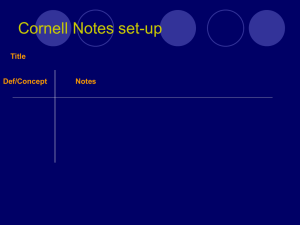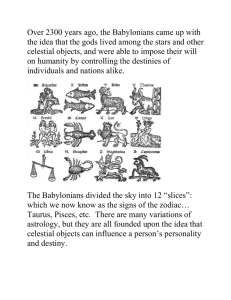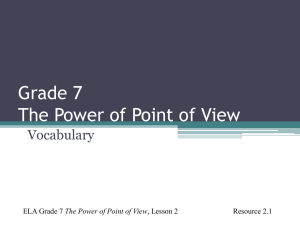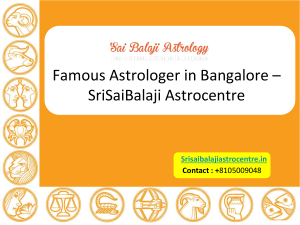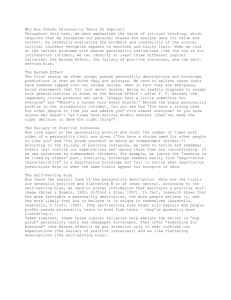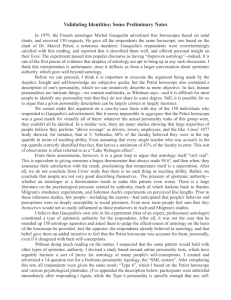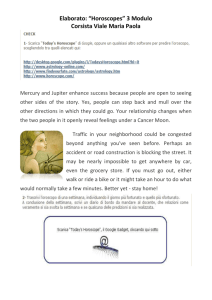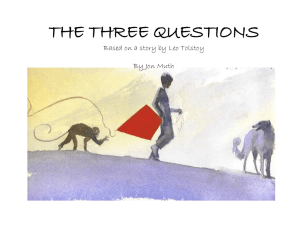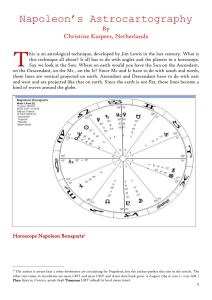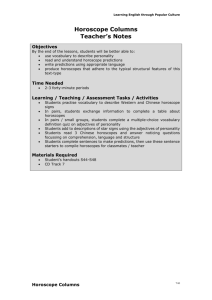astrology report
advertisement
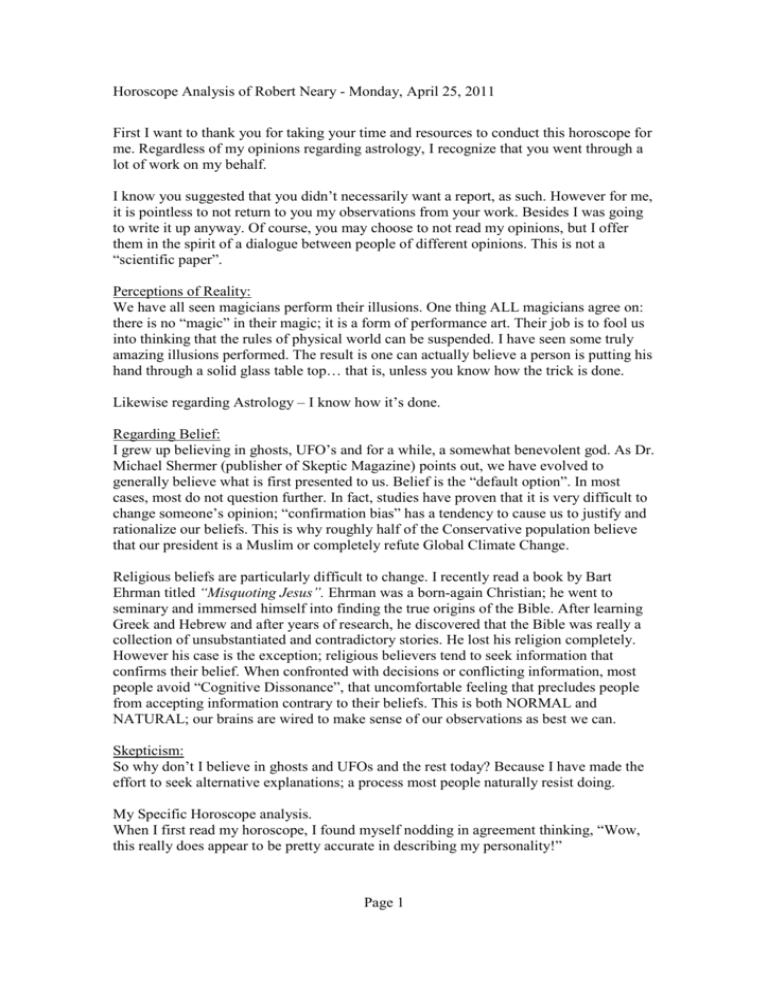
Horoscope Analysis of Robert Neary - Monday, April 25, 2011 First I want to thank you for taking your time and resources to conduct this horoscope for me. Regardless of my opinions regarding astrology, I recognize that you went through a lot of work on my behalf. I know you suggested that you didn’t necessarily want a report, as such. However for me, it is pointless to not return to you my observations from your work. Besides I was going to write it up anyway. Of course, you may choose to not read my opinions, but I offer them in the spirit of a dialogue between people of different opinions. This is not a “scientific paper”. Perceptions of Reality: We have all seen magicians perform their illusions. One thing ALL magicians agree on: there is no “magic” in their magic; it is a form of performance art. Their job is to fool us into thinking that the rules of physical world can be suspended. I have seen some truly amazing illusions performed. The result is one can actually believe a person is putting his hand through a solid glass table top… that is, unless you know how the trick is done. Likewise regarding Astrology – I know how it’s done. Regarding Belief: I grew up believing in ghosts, UFO’s and for a while, a somewhat benevolent god. As Dr. Michael Shermer (publisher of Skeptic Magazine) points out, we have evolved to generally believe what is first presented to us. Belief is the “default option”. In most cases, most do not question further. In fact, studies have proven that it is very difficult to change someone’s opinion; “confirmation bias” has a tendency to cause us to justify and rationalize our beliefs. This is why roughly half of the Conservative population believe that our president is a Muslim or completely refute Global Climate Change. Religious beliefs are particularly difficult to change. I recently read a book by Bart Ehrman titled “Misquoting Jesus”. Ehrman was a born-again Christian; he went to seminary and immersed himself into finding the true origins of the Bible. After learning Greek and Hebrew and after years of research, he discovered that the Bible was really a collection of unsubstantiated and contradictory stories. He lost his religion completely. However his case is the exception; religious believers tend to seek information that confirms their belief. When confronted with decisions or conflicting information, most people avoid “Cognitive Dissonance”, that uncomfortable feeling that precludes people from accepting information contrary to their beliefs. This is both NORMAL and NATURAL; our brains are wired to make sense of our observations as best we can. Skepticism: So why don’t I believe in ghosts and UFOs and the rest today? Because I have made the effort to seek alternative explanations; a process most people naturally resist doing. My Specific Horoscope analysis. When I first read my horoscope, I found myself nodding in agreement thinking, “Wow, this really does appear to be pretty accurate in describing my personality!” Page 1 Horoscope Analysis of Robert Neary - Monday, April 25, 2011 The problem is, like magician magic, I know how it’s done! My study and experience in Scientific Skepticism immediately revealed very familiar commonly used techniques; one of which is “Cold Reading”. In this technique, several statements are made; some very specific and others which are somewhat more vague. Given this set of information, the reader begins to evaluate the statements. What they are unaware of are a few normal and quite natural tendencies we have in our thinking processes – “Confirmation Bias”, “Subjective Validation” and the “Forer Effect”. Forer Effect: Psychologist Bertram R. Forer (1914-2000) found that people tend to accept vague and general personality descriptions as uniquely applicable to themselves without realizing that the same description could be applied to just about anyone. For example, in my horoscope, one of the statements was: “You think things out carefully but can make a decision impulsively when required.” Now there are likely some people who might deny they ever act impulsively, however a larger majority would more likely find this statement relevant. Subjective Validation: “Subjective Validation” causes people to find general statements (such as the one in the previous paragraph), be personally meaningful and significant. Subjective Validation is often designed into those “personality profiles” that employers sometimes use to attempt to classify or evaluate employees. Perhaps the subject usually does not act impulsively, but they do think things through carefully. The sentence is then meaningful and significant. Conversely, someone just the opposite might consider themselves impulsive; bingo, another positive hit. Confirmation Bias: “Confirmation Bias” results in the subject’s tendency to influence higher weight or value to statements which support their beliefs and discount or outright ignore statements which do not. In other words, count the “hits” and discount the “misses”. This is one I wrestle with personally, as we all do. It is very difficult to be completely objective; and particularly when we are faced with situations that reflect on us individually. Sometimes we are aware of our bias’ and STILL are unable to sidetrack them when we evaluate situations. Analysis of Results: I scanned the document into a spreadsheet where I could evaluate each sentence describing an aspect of my personality and character. I evaluated each of the statements based on five criteria: Yes – The characteristic matched. No – The characteristic did not match. Ambiguous – The statement contained no discernable meaning either way. Mutually Exclusive – The statement contained opposed or contradictory elements. Page 2 Horoscope Analysis of Robert Neary - Monday, April 25, 2011 Universal – The statement could apply to a broad range of people within a context or time. Recognizing that I would be difficult to be completely objective (due to my own Confirmation Bias) I also had Nancy answer a duplicate spreadsheet assessing my personality characteristics from her perspective. She was not allowed to view my horoscope prior to conducting the test. 162 statements Yes (True) No (False) Ambiguous Mutually Exclusive Universal Bob 66 73 11 2 48 Bob % 33% 26% 6% 2% 24% Nancy 85 65 16 12 49 Nancy % 37% 29% 7% 5% 22% In answering/evaluating each statement, it was possible that a statement could fit more than one condition – it might be “true” but it also might be “universal”. Indeed in comparing the results with Nancy, I had a tendency to NOT mark a statement as true IF I considered it to be “universal” Nancy, on the other hand, marked a statement as true about me even though it might also be universal, being true for lots of other people as well. Nancy and I took a very analytical approach to assessing each sentence, but do most people put this level of analysis into their horoscope as well? Likely not; take for example the statement: “You can be trusted in the most responsible positions that you often hold as a result of your drive for power and status.” In my case I certainly can be trusted in responsible positions (true) but I am not motivated by power and status (false). I think it is safe to assume that most people would apply Subjective Valuation, weighting the true and ignoring the false part and consider the statement true about them. Nancy actually marked that question as “ambiguous” whereas I answered it as “true” and “universal”. Even I tended to ignore the part of the question (motivated by power and status) that was not true for me. What this demonstrates is the high subjectivity of each statement – they are open for interpretation. So someone presented with their horoscope will read a statement, some of which they may find personally significant (Forer Effect) the remaining part is dismissed (Subjective Validation). When these statements are added to others containing mutually exclusive elements (such as thinking things out versus acting impulsively) again the tendency will likely cause them to evaluate it as true as well. Then throw into the mix general statements which may true to a wide array of people or statements which contain mutually exclusive elements (such as: “Your ideas may either be ahead or behind the times.”) will also be deemed accurate by the subject and added to the “hits”. The result of adding the specific hits, plus the partial hits, plus the universal hits, will reinforce the Cognitive Bias to the extent that the subject will believe the horoscope to be accurate specifically for them. Page 3 Horoscope Analysis of Robert Neary - Monday, April 25, 2011 So does Astrology work and if so, how? Astrology appears credible because it is designed to be. The techniques are common to Palm, Tarot, and many other forms of psychic practice. They rely on psychology and the underlying tendency for humans to see patters where none exist and to confirm beliefs they maintain about themselves. Astrology has been tested for centuries and numerous studies in recent decades. Studies show, for example, that when presented with several different horoscopes, subjects are unable to pick out of a choice of horoscopes which one is uniquely theirs. Studies have also been done on twins. As twins are born at the same time, their personality characteristics should be close, if not identical. This turns out to not be the case. Far more is being discovered almost daily by neuroscientists. For example it has been discovered that people who tend to hold strongly Conservative position show a larger Amygdala in brain scans, whereas those who consider themselves to be more Liberal show larger activity in the Anterior Cingulate Cortex. This is measurable and statistically significant. My wife worked in Social Services with abused children for a good part of her career. She has had children on her case load who were neglected in their early years. These children develop with an inability to “attach” to other humans and often lack a sense of empathy toward others. Yet what would a horoscope predict about their personality based on the date, time and location of their birth? Even after 4,000 years, there is no known or even hypothesized mechanism for how Astrology could work; how the positions of celestial objects at great distances at specific points of time could dictate human behavior traits. It is true that Continental Drift was accepted as a scientific theory before the discovery of Plate Tectonics. But science had a hypothesis and soon the mechanism of the movement of the earth’s crust was explained. But Astrology, even with the trappings of scientific sounding jargon (decans, cusps, houses, all of which are non-astronomical terms and concepts) lacks still even the remotest suggestion of how it works. If it can’t be explained, one is left only with faith (as does religious belief). Belief Systems: We have two courses available to us when confronted with situations which require our acceptance or belief. We can accept it on face value (which we normally and naturally have a tendency to do) or we can question the validity of the concept. When the belief effects us personally (religious belief, for example) it is difficult and often UNCOMFORTABLE to try to see the other perspective. Dorothy believed in the great all-powerful OZ until Toto pulled the curtain aside. That’s what Skeptics do, we’re Toto. Page 4

